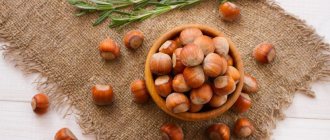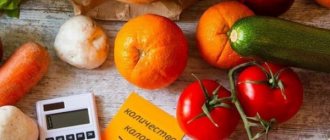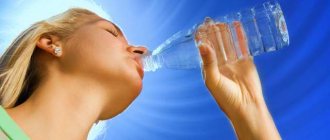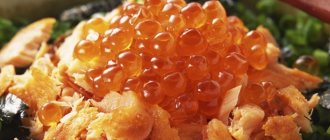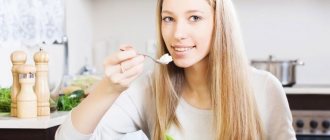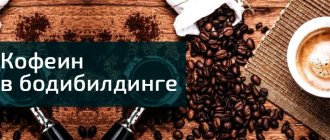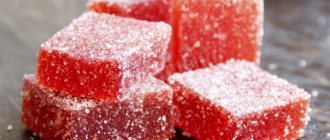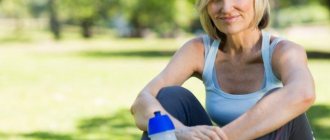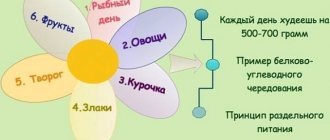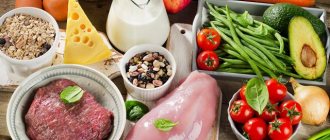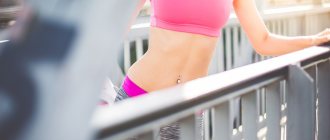General rules
A woman’s hormonal background changes throughout the cycle and affects her mood, general condition, performance and appearance. Due to the influence of hormones (in particular, progesterone in the second half of the cycle, starting from days 15-16), a natural reaction occurs before menstruation - fluid retention, which causes weight gain and swelling of the face, arms and abdomen.
On average, weight fluctuations are 2-3 kg. Don't be upset - these are not extra pounds due to fat deposits, but fluid that will go away with the end of your period. On the eve of critical days, irritability appears, many note a strong craving for sweets and an increase in appetite. The body tries to stock up on nutrients for future use. If you do not control your appetite, carbohydrates will be stored “in reserve” in the form of fat. A possible cause of sweet cravings is low blood sugar due to skipping meals. Therefore, you need to eat small portions and often - up to 6 times a day.
All effects of progesterone will be expressed before the start of the next cycle. At this time, the woman experiences premenstrual tension syndrome , which includes, in addition to the symptoms described above, bloating, drowsiness , lethargy and soreness of the mammary glands.
A diet for PMS will help correct this condition. A week before your period, it is recommended:
- limit the amount of salt, salty foods (soy sauce, salted fish, herring, salted nuts, cheeses, sausages, pickles and marinades);
- use caution with caffeine-containing drinks and alcohol, which retain water and further increase swelling;
- include a decoction of diuretic herbs in the diet: dill, parsley, horsetail, corn silk, celery stalks.
Already a week before the start of your period, you need to eat food rich in fiber and complex carbohydrates (cabbage, apples, cereals, legumes, bran, whole grain bread, seeds and sunflower seeds). Fiber helps remove water from the body. It has been noticed that seafood helps fight chocolate cravings. This is an ideal nutrition option during this period - it contains few calories and sufficient amounts of protein, iron and zinc.
Do I need a diet during menstruation to lose weight? Directly during menstruation, special nutrition for the purpose of losing weight is contraindicated. It must be said that this is not the best time to diet. This will only worsen depression and be stressful for the body.
These days there is a decrease in the level of estrogen , a hormone necessary for the production of serotonin (the mood hormone). Therefore, many women are prone to depression or at least depressed mood. This also explains the craving for sweets, especially chocolate. Nutritionists advise sticking to a medium-calorie diet during this period, and not going on fasting days or strict diets.
Taking into account the hormonal changes during your period, it becomes clear why attempts to lose weight are futile. Weight gain depends on progesterone, the level of which increases before menstruation. This hormone prepares the female body for pregnancy and promotes the accumulation of fat deposits. But this process can be influenced by adhering to proper nutrition.
Nutrition during menstruation should be rational and healthy. The beginning of the cycle is associated with discomfort, and for many women with painful sensations. During the first days, it is advisable to consume only complex carbohydrates that are slowly absorbed by the body: whole grain bread, cereals (especially rice and buckwheat), legumes, various vegetables and fruits.
Give up “bad” carbohydrates (sweets, cakes, pastries, sweet pastries, cookies) and replace them with fruits and berries, honey, dried fruits, cereals with added honey and dried fruits. Include dried apricots, prunes, raisins, dried pears in your diet - they are quite sweet due to their fructose content and, in combination with cottage cheese or yogurt, can easily replace desserts. These products will help improve your mood, provide vitamins and energy, and at the same time there will be less risk of gaining extra centimeters and kilograms.
During this period, it is better to exclude extractive and central nervous system stimulating substances and dishes:
- coffee Tea;
- strong meat broths, fried and stewed meats;
- chocolate.
Including magnesium-rich foods in your diet will help overcome irritability and headaches. We get magnesium by eating cereals, nuts, bran, seeds, dark green vegetables, peas and beans, buckwheat and millet groats. Nuts and seeds (flax, sunflower, pumpkin, poppy, sesame) can be a healthy snack at work when you feel hungry. They also contain vitamin E, which regulates the production of serotonin and has a beneficial effect on the reproductive system. Therefore, additionally include vegetable oils and soybeans in your diet.
Potassium regulates water-salt metabolism and promotes the removal of fluid from the body, and this is very important during this period; it also prevents the occurrence of depression. All nuts, dried apricots, raisins, prunes, bananas, cabbage, and leafy vegetables contain a lot of potassium.
In the middle of the cycle (8-14 days), you can add more calories and include protein foods: seafood, fish and meat dishes, eggs, more cottage cheese. Carbohydrates should be reduced. The calorie content of food should be 1400 kcal.
At the end of the cycle (days 15-28), you can add sweet foods, but avoid eating heavy foods. As before, vegetables and fish should predominate in the diet.
If you have painful periods, you should include in your diet:
- bananas and chocolate;
- vitamins and minerals (they help reduce the tone of the uterus);
- drink wine with orange juice at night;
- give up coffee, salt and salty foods.
You can maintain your iron levels by eating:
- red meat;
- oysters, squid, shrimp;
- caviar, red fish;
- whole buckwheat porridge;
- apples, lettuce, prunes, dried apricots, raisins;
- broccoli and kohlrabi;
- liver (veal, beef, chicken);
- pomegranate juice.
Many women are bothered by bloating. In this case, you need to temporarily avoid cabbage, yeast bread, potatoes, bananas, legumes, grapes, carbonated drinks, and kvass. Herbal teas can help reduce pain. You can drink tea consisting of 1 teaspoon mint and 2 teaspoons green tea, nettle infusion.
High-intensity training is also not recommended during this period. From the fourth day of menstruation, you can do your usual exercise in the gym, since from the 4th to the 25th day of the cycle, women can easily tolerate all kinds of physical activity.
You can start a low-calorie diet immediately after the end of your period - during this period, your appetite decreases and you can complete the nutrition you have planned to the end without stressing the body. A favorable time to start a diet is the period of estrogen influence, the level of which increases every day after the end of menstruation until the 14-15th day of the cycle. This hormone helps the body burn fat, improves mood and suppresses appetite. At this time, a woman is in a good mood, she is motivated and confident, and her body can easily accept changes, particularly in nutrition.
Is it possible to fast during menstruation?
Medicine is not against fasting, which is used to treat severe allergies , psoriasis , eczema , bronchial asthma and other diseases. As for fasting during menstruation, opinions are divided. Periodic bleeding is not a contraindication, but some believe that it is still not worth starting it during this period. If you are already in the process of fasting, then there is no need to interrupt it during your period.
Another opinion is based on the fact that fasting, especially for 2-5 days, should be timed to coincide with the beginning of menstruation. The end of them indicates the renewal of the woman’s body, the need for food, and the need to get out of hunger. If long-term fasting is undertaken (7-30 days), then the exit from it should also be timed to coincide with the end of menstruation.
You need to know that fasting can cause disruption of the menstrual cycle - it becomes erratic or periods may be completely absent. The cycle will have to be restored with hormonal drugs, which poses the risk of weight gain if fasting is undertaken for this purpose. Remember that prolonged fasting at home is dangerous due to all sorts of complications (vomiting, convulsions, increased blood pressure), and it is also impossible to take appropriate measures to remove ketone bodies and reduce intoxication .
Also, many people note that after the diet there are no periods. An unbalanced low-calorie diet (at the level of 1000-1200 kcal) and limited intake of proteins, fats and carbohydrates causes hormonal disorders. The reproductive system is especially sensitive and, against the background of significant weight loss, an imbalance of sex hormones develops. Long-term absence of menstruation leads to irreversible changes ( infertility ).
The main cause of cycle disorders is low consumption or absence of animal fats in the diet, which are involved in the production of sex hormones. Cholesterol is the substance that is necessary for their synthesis. The coordinated work of the pituitary-hypothalamus-ovarian system is disrupted and progesterone is produced in insufficient quantities.
Plant foods do not replace animal foods, so vegetarianism can also lead to menstrual irregularities. An often discussed topic is how a raw food diet and menstruation are related. We can say that a diet low in protein, raw vegetables and fruits, initially leads to an increase in intervals, and with prolonged such nutrition, menstruation disappears completely.
How to get your period back after a diet?
Sudden weight loss and reduction in fat mass causes cycle disorders. Menstruation is restored after switching to a healthy and rational diet and restoring weight to normal.
To restore the menstrual cycle you need:
- increase calorie intake;
- adjust the consumption of fats/proteins/carbohydrates (per 1 kg of weight: proteins 2 g, fats 1-1.3 g, carbohydrates 2.5 g);
- maintain a drinking regime (40 ml per 1 kg of weight);
- connect vitamin and mineral complexes;
- reduce the intensity of the load.
The diet should include: vegetable oils, butter, fish oil, seafood, fish, meat, vegetables, fruits, eggs, cereals, legumes, dairy and fermented milk products, seeds, nuts, dried fruits. It is also important to follow a diet.
Decoctions of herbs, such as oregano, will help you get your period back. Traditional medicine calls it a woman’s herb and “mother’s herb” because it is used for many women’s diseases, including helping to restore hormonal levels and menstruation. To prepare an infusion of oregano, you need to take 2 teaspoons of the herb and pour 200 ml of boiling water. Leave for 20 minutes. After straining, drink 1/3 glass three times a day.
If all the measures taken do not help restore reproductive function, be sure to visit a gynecologist - hormonal therapy may be necessary.
Reasons for weight changes during menstruation
Hormones such as progesterone and estrogen are responsible for the hormonal background of women. At the beginning of the menstrual cycle, the amount of estrogen increases and progesterone decreases. This nuance is simply impossible to control. Before the menstrual cycle, hormones force the body to store excess fluid, as it is lost by the body along with secretions. As a result of excessive amounts of water, swelling occurs, which disappears after a few days.
But this is not the only reason why weight gain is observed during menstruation. At this time, hormone surges occur, which provoke appetite. It becomes uncontrollable, women cannot deny themselves many foods, and eating breakdowns are observed. To avoid this, you need to follow a diet before and during your menstrual cycle.
Authorized Products
- Vegetables and fruits contain antioxidants , which to some extent reduce the pain symptom. They have a positive effect on digestion and improve intestinal motility, preventing constipation . Among fruits, preference should be given to bananas, apples, and apricots, as they contain potassium, iron and magnesium. The composition of vegetables is any, but broccoli contains folic acid and calcium, eggplants contain potassium and magnesium, and lentils should be chosen as a high-protein product.
- Rye bread, with bran, whole grain.
- It is better to cook soups with weak and low-fat broths. There is a wide choice of them according to your preferences: vegetable, mushroom, borscht, rassolnik, cabbage soup, beetroot soup.
- Any fish and seafood. They contain a sufficient amount of iodine and vitamin D , which is necessary for the absorption of calcium. Fatty acids relieve pain to some extent.
- Be sure to include fermented milk products, cottage cheese, cheese and milk in your diet (if tolerated). Calcium and vitamins are necessary to restore the body during this period.
- It is better to choose low-fat varieties of meat and poultry. Their proteins, amino acids and iron will be beneficial during your period, especially red meat, which contains more iron. The liver is also useful in this regard.
- Eggs in any preparation.
- Various cereals (preferably whole grains), legumes are included if well tolerated.
- Introduce various vegetable oils into your diet - a source of vitamin E and unsaturated fatty acids.
- Nuts and seeds are sources of vitamins, microelements, and fatty acids.
- Recommended drinks include green tea, rosehip infusion, and herbal infusions, which were mentioned above.
Table of permitted products
| Proteins, g | Fats, g | Carbohydrates, g | Calories, kcal | |
Vegetables and greens | ||||
| vegetables legumes | 9,1 | 1,6 | 27,0 | 168 |
| zucchini | 0,6 | 0,3 | 4,6 | 24 |
| cabbage | 1,8 | 0,1 | 4,7 | 27 |
| cauliflower | 2,5 | 0,3 | 5,4 | 30 |
| carrot | 1,3 | 0,1 | 6,9 | 32 |
| cucumbers | 0,8 | 0,1 | 2,8 | 15 |
| beet | 1,5 | 0,1 | 8,8 | 40 |
| pumpkin | 1,3 | 0,3 | 7,7 | 28 |
Fruits | ||||
| apricots | 0,9 | 0,1 | 10,8 | 41 |
| oranges | 0,9 | 0,2 | 8,1 | 36 |
| watermelon | 0,6 | 0,1 | 5,8 | 25 |
| bananas | 1,5 | 0,2 | 21,8 | 95 |
| pears | 0,4 | 0,3 | 10,9 | 42 |
| melon | 0,6 | 0,3 | 7,4 | 33 |
| lime | 0,9 | 0,1 | 3,0 | 16 |
| lemons | 0,9 | 0,1 | 3,0 | 16 |
| tangerines | 0,8 | 0,2 | 7,5 | 33 |
| plums | 0,8 | 0,3 | 9,6 | 42 |
| apples | 0,4 | 0,4 | 9,8 | 47 |
Berries | ||||
| strawberry | 0,8 | 0,4 | 7,5 | 41 |
| sea buckthorn | 1,2 | 5,4 | 5,7 | 82 |
| currant | 1,0 | 0,4 | 7,5 | 43 |
| rose hip | 1,6 | 0,0 | 14,0 | 51 |
Mushrooms | ||||
| mushrooms | 3,5 | 2,0 | 2,5 | 30 |
Nuts and dried fruits | ||||
| raisin | 2,9 | 0,6 | 66,0 | 264 |
| dried apricots | 5,2 | 0,3 | 51,0 | 215 |
| sunflower seeds | 20,7 | 52,9 | 3,4 | 578 |
| pumpkin seeds | 24,5 | 45,8 | 4,7 | 556 |
| dates | 2,5 | 0,5 | 69,2 | 274 |
| prunes | 2,3 | 0,7 | 57,5 | 231 |
Cereals and porridges | ||||
| buckwheat (kernel) | 12,6 | 3,3 | 62,1 | 313 |
| cereals | 11,9 | 7,2 | 69,3 | 366 |
| corn grits | 8,3 | 1,2 | 75,0 | 337 |
| pearl barley | 9,3 | 1,1 | 73,7 | 320 |
| millet cereal | 11,5 | 3,3 | 69,3 | 348 |
| brown rice | 6,3 | 4,4 | 65,1 | 331 |
| barley grits | 10,4 | 1,3 | 66,3 | 324 |
Bakery products | ||||
| Rye bread | 6,6 | 1,2 | 34,2 | 165 |
| bran bread | 7,5 | 1,3 | 45,2 | 227 |
Raw materials and seasonings | ||||
| honey | 0,8 | 0,0 | 81,5 | 329 |
| sour cream sauce | 1,9 | 5,7 | 5,2 | 78 |
Dairy | ||||
| milk | 3,2 | 3,6 | 4,8 | 64 |
| kefir | 3,4 | 2,0 | 4,7 | 51 |
| curdled milk | 2,9 | 2,5 | 4,1 | 53 |
| acidophilus | 2,8 | 3,2 | 3,8 | 57 |
| yogurt | 4,3 | 2,0 | 6,2 | 60 |
Cheeses and cottage cheese | ||||
| cheese | 24,1 | 29,5 | 0,3 | 363 |
| cottage cheese | 17,2 | 5,0 | 1,8 | 121 |
Meat products | ||||
| beef | 18,9 | 19,4 | 0,0 | 187 |
| veal | 19,7 | 1,2 | 0,0 | 90 |
| rabbit | 21,0 | 8,0 | 0,0 | 156 |
Bird | ||||
| chicken | 16,0 | 14,0 | 0,0 | 190 |
| turkey | 19,2 | 0,7 | 0,0 | 84 |
Eggs | ||||
| chicken eggs | 12,7 | 10,9 | 0,7 | 157 |
Fish and seafood | ||||
| canned fish | 17,5 | 2,0 | 0,0 | 88 |
Oils and fats | ||||
| butter | 0,5 | 82,5 | 0,8 | 748 |
| corn oil | 0,0 | 99,9 | 0,0 | 899 |
| olive oil | 0,0 | 99,8 | 0,0 | 898 |
| sunflower oil | 0,0 | 99,9 | 0,0 | 899 |
Non-alcoholic drinks | ||||
| mineral water | 0,0 | 0,0 | 0,0 | — |
| lingonberry juice | 0,1 | 0,0 | 10,7 | 41 |
| green tea | 0,0 | 0,0 | 0,0 | — |
Juices and compotes | ||||
| compote | 0,5 | 0,0 | 19,5 | 81 |
| apricot juice | 0,9 | 0,1 | 9,0 | 38 |
| carrot juice | 1,1 | 0,1 | 6,4 | 28 |
| tomato juice | 1,1 | 0,2 | 3,8 | 21 |
| pumpkin juice | 0,0 | 0,0 | 9,0 | 38 |
| rose hip juice | 0,1 | 0,0 | 17,6 | 70 |
| * data is per 100 g of product | ||||
What is important for every woman to know
Women's periods require constant perineal hygiene. Before each change of sanitary tampons and pads, you must wash your genitals and hands with running water and soap. During menstruation, the body is cleansed and blood discharge comes out. For these purposes, the best hygiene products are sanitary pads. Modern materials have excellent absorbency, protection against leaks, secretions come out and do not accumulate in the cervical canal, as when using tampons. A woman’s lifestyle during her period must meet the following criteria:
Fully or partially limited products
- Sweets, pastries, flour products, cakes, pastries.
- Fatty concentrated broths, fatty meat and poultry.
- Margarine and refractory fats.
- Alcohol.
- Smoked meats, fatty cheeses, sausages, canned food, fast food.
- Salt is limited.
Table of prohibited products
| Proteins, g | Fats, g | Carbohydrates, g | Calories, kcal | |
Vegetables and greens | ||||
| canned vegetables | 1,5 | 0,2 | 5,5 | 30 |
| canned cucumbers | 2,8 | 0,0 | 1,3 | 16 |
| canned tomatoes | 1,1 | 0,1 | 3,5 | 20 |
| horseradish | 3,2 | 0,4 | 10,5 | 56 |
Berries | ||||
| grape | 0,6 | 0,2 | 16,8 | 65 |
Bakery products | ||||
| bagels | 16,0 | 1,0 | 70,0 | 336 |
| buns | 7,2 | 6,2 | 51,0 | 317 |
| butter horns | 8,3 | 12,1 | 50,5 | 345 |
| drying poppy seeds | 11,3 | 4,4 | 70,5 | 372 |
Confectionery | ||||
| jam | 0,3 | 0,2 | 63,0 | 263 |
| jam | 0,3 | 0,1 | 56,0 | 238 |
| jelly | 2,7 | 0,0 | 17,9 | 79 |
| pastry cream | 0,2 | 26,0 | 16,5 | 300 |
| fruit and berry marmalade | 0,4 | 0,0 | 76,6 | 293 |
| Kurabye cookies | 6,7 | 25,8 | 64,6 | 516 |
| oatmeal cookies | 6,5 | 14,4 | 71,8 | 437 |
| cake | 3,8 | 22,6 | 47,0 | 397 |
Cakes | ||||
| cake | 4,4 | 23,4 | 45,2 | 407 |
Chocolate | ||||
| chocolate | 5,4 | 35,3 | 56,5 | 544 |
Raw materials and seasonings | ||||
| mustard | 5,7 | 6,4 | 22,0 | 162 |
| ketchup | 1,8 | 1,0 | 22,2 | 93 |
| mayonnaise | 2,4 | 67,0 | 3,9 | 627 |
| ground black pepper | 10,4 | 3,3 | 38,7 | 251 |
| sugar | 0,0 | 0,0 | 99,7 | 398 |
| vinegar | 0,0 | 0,0 | 5,0 | 20 |
Dairy | ||||
| cream | 2,8 | 20,0 | 3,7 | 205 |
| sour cream | 2,8 | 20,0 | 3,2 | 206 |
Meat products | ||||
| pork | 16,0 | 21,6 | 0,0 | 259 |
Bird | ||||
| smoked chicken | 27,5 | 8,2 | 0,0 | 184 |
| duck | 16,5 | 61,2 | 0,0 | 346 |
| smoked duck | 19,0 | 28,4 | 0,0 | 337 |
| goose | 16,1 | 33,3 | 0,0 | 364 |
Fish and seafood | ||||
| smoked fish | 26,8 | 9,9 | 0,0 | 196 |
Oils and fats | ||||
| creamy margarine | 0,5 | 82,0 | 0,0 | 745 |
| animal fat | 0,0 | 99,7 | 0,0 | 897 |
| cooking fat | 0,0 | 99,7 | 0,0 | 897 |
Non-alcoholic drinks | ||||
| black tea | 20,0 | 5,1 | 6,9 | 152 |
| * data is per 100 g of product | ||||
Menu (Power Mode)
The range of products is quite diverse, and the list of prohibited products is not long. In general, this is a healthy and rational diet that should be followed constantly to maintain weight at the same level. When creating a menu, monitor the total calorie content and its distribution.
Lunch should be the most plentiful, breakfast should account for 30% of the total diet, and dinner 20%, the rest is allocated for small snacks. If you are interested in losing weight, then carbohydrates (even complex ones should be consumed in the first half of the day, and dinner should consist only of vegetables and the protein component of the diet, fish, cottage cheese, eggs, chicken, etc.).
Reviews and results
The diet has optimal caloric content and a high content of vitamins; if a woman seems to find this not enough (especially in winter due to the lack of fruits and berries), then additional medications can be taken. Many note that the diet is difficult to tolerate due to the restriction of sweet foods, especially since the craving for them is increased. Some people are not satisfied with the consumption of dried fruits and sweet fruits, and for these reasons the diet is often interrupted.
- “... I have PMS, which is accompanied by irritability and swelling. 10 days before, I decided to go on a diet. Lost 2 kg. I try to stick to proper nutrition, but I am so drawn to sweets that I have no strength to resist. Often in the evening after work I break down - gingerbread and chocolate are used. Is it healthier to eat an apple or cottage cheese with dried fruits? But I can’t overcome myself. Apparently, you need to come to such nutrition gradually and make it a rule of life, then the lack of sweets will not be so hard to bear”;
- “... The weight gain these days is always 1.5 kg. It is clear that fluid is retained. On critical days, it is difficult to follow a diet, as the appetite wakes up brutally. I try to eat everything unsalted and it helps: my stomach shrinks, my cheeks fall in, and the ring doesn’t dig into my finger. I eat fish, meat, all vegetables, apples, low-fat cottage cheese and kefir. I don't eat fried or sweet foods. This diet helps with edema, but my pain still doesn’t go away—only pills help”;
- “... After fasting for the second month there are no periods. After the first visit, my periods were delayed for two months in a row, and after the second, they completely disappeared. Moreover, the weight did not decrease much - only 7 kg. I'm very upset that so much effort was put in and now it's starting to fail. I understand that if I start eating as usual, the kilograms will come back. So it turns out to be a vicious circle.”
Menstrual hygiene products
Many gynecologists are against wearing tampons during menstruation. It is allowed to use tampons only 1-2 times , for example, for a certain outfit or while visiting the pool (accompanying a child, relaxing with family on the beach). The reasons for the ban are the following:
high risks of vaginal infection;
traumatization of the mucous membranes of the cervical canal.
Changing tampons does not always take place in sterile conditions, when it is possible to wash your hands with soap and wash the perineum. When worn for a long time, a warm environment promotes rapid decomposition of blood cells, unpleasant odor, and infection.
During menstruation, it is better to use pads, which should be changed at least every 4 hours. This is necessary for scanty discharge. Excessive bleeding can be controlled using urinary pads.
